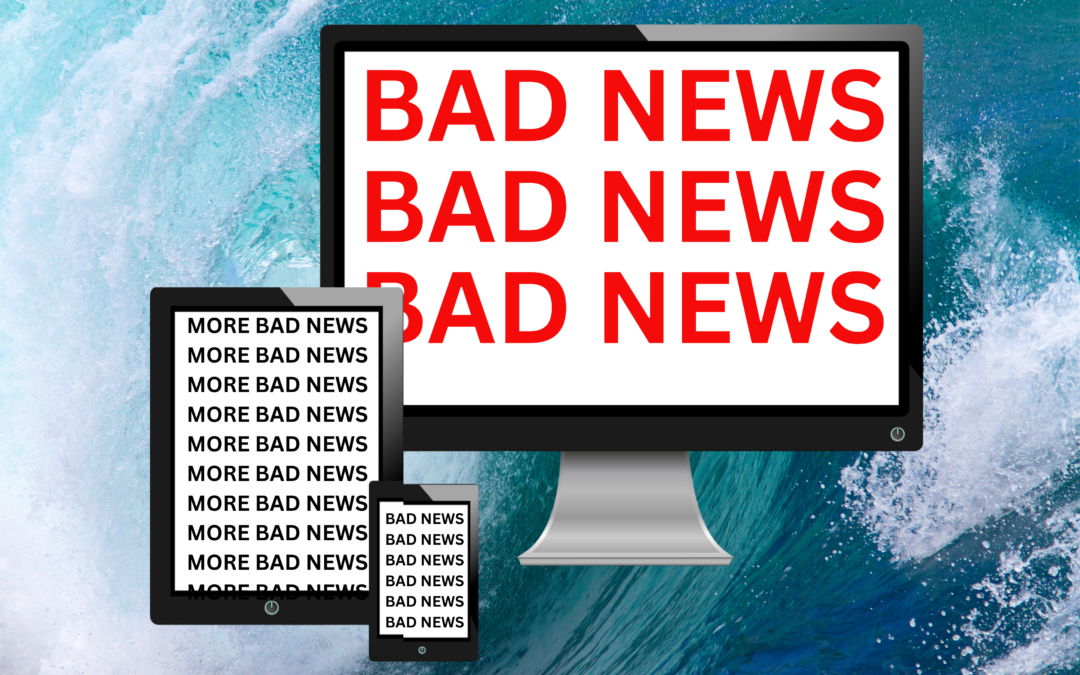One of the Oxford English Dictionary’s words of the year for 2020 was doomscrolling. Amid COVID outbreaks, perpetual lockdowns, and ever-changing social distancing rules, the term perfectly captured our compulsion to check our devices for the latest dose of bad news. Now, with a new president in the White House and another storm of crises brewing, it seems the word is making a comeback. Once again, we wake up to an avalanche of bad news stories.
But Doomscrolling is no longer the word. We aren’t just scrolling through bad news – it’s crashing over us. So, I propose a new term for 2025: newsnami.
That’s exactly what it feels like. The political earthquake in Washington has unleashed a tsunami of headlines, each more dizzying and bewildering than the last. Story after story leaves us feeling confused, helpless, and more fearful for the future than we have been in generations.
In response to this newsnami, there are some media outlets who have at least made some acknowledgement of their duty of care to their audiences. Over breakfast recently, I heard a discussion on Radio 4’s Today programme on this very topic. Sage advice was offered by guest experts: keep a gratitude journal; get out in nature; switch off the notifications. These are all helpful suggestions, and worth putting in place. But as a Christian, I am aware of my responsibility not to bury my head in the sand, but to confront the bad news of the world with the good news of Jesus.
And so, there must be some other way of dealing with our feelings of helplessness over Ukraine, or the climate crisis, or Gaza, or the cost of living, or DR Congo, or the devastating cuts to foreign aid, or growing political polarization across the Western world… I could go on, but this list is chest tightening enough!
So, if disengaging isn’t the answer, what is?
Well, I want to suggest a counter-intuitive solution. Don’t ignore your helplessness at the state of the world, embrace it. Because what if acknowledging our helplessness is the key to hope? After all, none of us in in control. Our only help, as the Psalmist reminds us…is in the name of the Lord, the Maker of heaven and earth.
Acknowledging our limitations – our essential helplessness – is required if we are to do the good works God has prepared for us to do. We must begin with disavowing ourselves of any notion that we, or our nation, or our ideology is the saviour the world needs. The Saviour has already come, and he only asks that we play our part
In my congregation we are in the middle of a teaching series on justice. We have been navigating the waves of the newsnami alongside the white waters of God’s justice. One of our guides on this journey has been the theologian Isabelle Hamley. In her book, Embracing Justice, she says this about our feelings of helplessness and even despair in the face of injustice…
“Acknowledging the complexity of doing justice in an interconnected world can lead to despair, but it is vital… It is an antidote against trying to turn ourselves into God.”
Her words remind us of a crucial truth: we were never meant to carry the weight of the world alone. Justice is God’s work – we are simply called to play our part.
So, as the newsnami continues to rage, we must choose our response. We can give in to the endless tide of doomscrolling. We can turn away, numbing ourselves with distraction. Or we can do something far more radical – we can face our helplessness and place it in the hands of the One who holds all things together.
Our hope is not in presidents or prime ministers. It is not in policies or protests. Our hope is in the One who at another time of disruption and uncertainty spoke words of reality and hope.
“In this world, you will have trouble. But take heart! I have overcome the world” (John 16:33).
Please note that the statements and views expressed in this article of those of the author and do not necessarily represent those of Contemporary Christianity.


Thank-you, Paul. for this timely contribution. I am trying during this Lenten season to focus on and, as far as possible practice, lwhat a wilderness experience would have been like with no camping gear, no food but what might be foraged from limited sources, no human sounds, no mobile phones, social media or news apps. The silence does appeal to me! But then I remembered while I am not of this world, I am presently in this world and believe I have a responsibility to be aware of what is happening to my ‘neighbour’. I don’t tune in to every news bulletin/ notification and am so far managing on one check of headlines in the morning and one evening broadcast which then inform and feed into my prayers of intercession and even gratitude. I am not buying newspapers – money will go to charity – radio or TV only on for aforementioned news checks.
I do continue to respond to phone calls and necessary emails.
Thank you. A very helpful perspective to offset the sense of being overwhelmed by the level of disaster and injustice world wide.
Have just r-read this
Such a helpful reminder
As Ps 37 says…Do not fret…